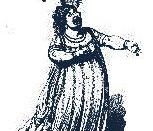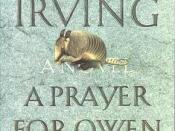In the book A Prayer for Owen Meany the topic of voice is used frequently throughout the story, and is eventually an important part in the final climax of the story. While the topic of voice is mostly ascribed to Owen Meany throughout the book as he's described as having a voice "not entirely of this world" (5), the theme is also used to convey the personalities of several main characters in the story. Tabitha Wheelwright is said to have a "truly angelic voice", Mr. Meany's dialogue is always simple and somewhat uneducated, while Harriet Wheelwright's voice is regal and entitled.
One of the patterns throughout the book is Owen's dialogue being presented in all capital letters coming from when Owen "The Voice" in his columns for the Gravesend Academy paper and writes in all capitals, later saying that he was "always going to be published in capitals" (289). The use of capitals in Owen's speech is an immediate attention grabber most likely used as a parallel of how Owen's actual voice is also an instant attention grabber.
One of the biggest patterns concerning the topic of voice was the constant criticism of Owen's voice and questioning of why he didn't have it fixed. Even when Tabitha's former voice teacher says he can prescribe some exercises or a doctor, Owen refuses due to his belief that God made him how he is for a reason. This is later confirmed at the end of the story when it's because of Owen's strange voice that the Vietnamese children obey him and lie down; a final confirmation of Owen's faith. While there are several theme presented throughout A Prayer for Owen Meany, that of voice is one of the most important because Owen's voice in the end, at least to Johnny Wheelwright,


